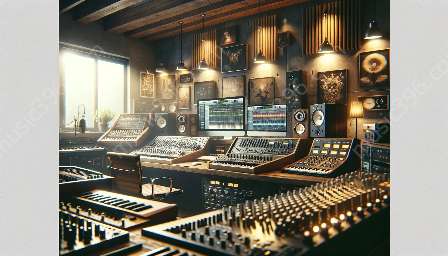Introduction
Music recording and production have been shaped by a wide range of factors, including advancements in technology, artistic expression, and ethical considerations. In this topic cluster, we will explore the intersection of these elements, focusing on the ethical aspects of music recording and production in relation to the history and evolution of recording technology.
History and Evolution of Music Recording Technology
The history of music recording technology is a fascinating journey that spans several centuries. From the early days of mechanical recording devices to the digital revolution, technology has continuously transformed the way music is captured and produced. Each era has brought new possibilities and challenges, influencing the ethical considerations within the music recording and production industry.
The Impact of Technological Advancements
As technology advanced, the recording process became more accessible and efficient. The introduction of multitrack recording, digital audio workstations, and virtual instruments revolutionized the music production process. While these innovations provided new creative possibilities, they also raised ethical concerns.
Human Element in Recording
Despite the technological advancements, the human element remains crucial in music recording and production. Ethical considerations often revolve around the treatment of artists, the responsibilities of producers and engineers, and the impact of automation on creative expression. Maintaining a balance between technological efficiency and ethical practice is a continual challenge in the music industry.
Ethical Considerations in Music Recording and Production
Artist Rights and Fair Compensation
Respecting the rights of musicians and ensuring fair compensation is a significant ethical consideration in music recording and production. Issues such as royalty distribution, copyright protection, and transparency in contracts require careful attention to maintain ethical standards.
Representation and Cultural Sensitivity
Music is a reflection of diverse cultures and experiences. Ethical recording and production practices involve representing various cultural perspectives authentically and responsibly. This includes avoiding cultural appropriation, respecting traditional music, and promoting diversity in the music industry.
Environmental Impact
As technology continues to evolve, the environmental impact of music recording and production should not be overlooked. Ethical considerations encompass eco-friendly studio practices, sustainable production methods, and responsible waste management to minimize the industry's environmental footprint.
Digital Manipulation and Authenticity
The widespread use of digital tools in music production raises ethical concerns regarding the authenticity of recordings. Issues such as auto-tuning, sample manipulation, and the alteration of performances have sparked discussions about maintaining artistic integrity and representing genuine musical expressions.
Consumer Rights and Misrepresentation
Consumers have the right to receive accurate representations of music recordings. Ethical considerations in production include transparency in audio quality, truthful marketing practices, and avoiding deceptive techniques that misrepresent the true nature of recordings.
The Intersection of Ethics and Technology
Understanding the ethical considerations in music recording and production requires an exploration of how technology influences creative decisions and industry practices. As digital tools become increasingly powerful, examining their ethical implications becomes essential to maintain the integrity of music production.
Balancing Artistic Freedom and Commercial Pressures
Artistic freedom is essential in music creation, but commercial pressures can sometimes compromise ethical decisions. The pursuit of profit should not overshadow ethical responsibilities, and the industry must strive to support both artistic integrity and financial sustainability.
Privacy and Data Security
In an era of streaming services and digital distribution, data security and privacy concerns are paramount. Ethical production practices involve safeguarding the personal information of artists, producers, and consumers, as well as respecting their privacy rights in the digital landscape.
Conclusion
Music recording and production have a rich history intertwined with technological advancements and ethical considerations. By examining the complex relationship between these elements, the industry can strive for ethical practices that honor artistic expression, value human contributions, and reflect societal values. As technology continues to evolve, it is essential to navigate the ethical landscape of music recording and production with mindful consideration for the impact on artists, audiences, and the environment.



































